中西方时间观念差异-英文
- 格式:doc
- 大小:15.50 KB
- 文档页数:2

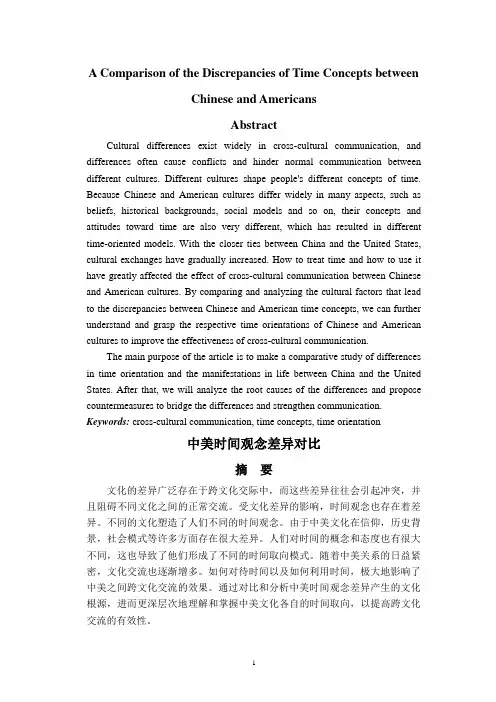
A Comparison of the Discrepancies of Time Concepts betweenChinese and AmericansAbstractCultural differences exist widely in cross-cultural communication, and differences often cause conflicts and hinder normal communication between different cultures. Different cultures shape people's different concepts of time. Because Chinese and American cultures differ widely in many aspects, such as beliefs, historical backgrounds, social models and so on, their concepts and attitudes toward time are also very different, which has resulted in different time-oriented models. With the closer ties between China and the United States, cultural exchanges have gradually increased. How to treat time and how to use it have greatly affected the effect of cross-cultural communication between Chinese and American cultures. By comparing and analyzing the cultural factors that lead to the discrepancies between Chinese and American time concepts, we can further understand and grasp the respective time orientations of Chinese and American cultures to improve the effectiveness of cross-cultural communication.The main purpose of the article is to make a comparative study of differences in time orientation and the manifestations in life between China and the United States. After that, we will analyze the root causes of the differences and propose countermeasures to bridge the differences and strengthen communication. Keywords: cross-cultural communication, time concepts, time orientation中美时间观念差异对比摘要文化的差异广泛存在于跨文化交际中,而这些差异往往会引起冲突,并且阻碍不同文化之间的正常交流。
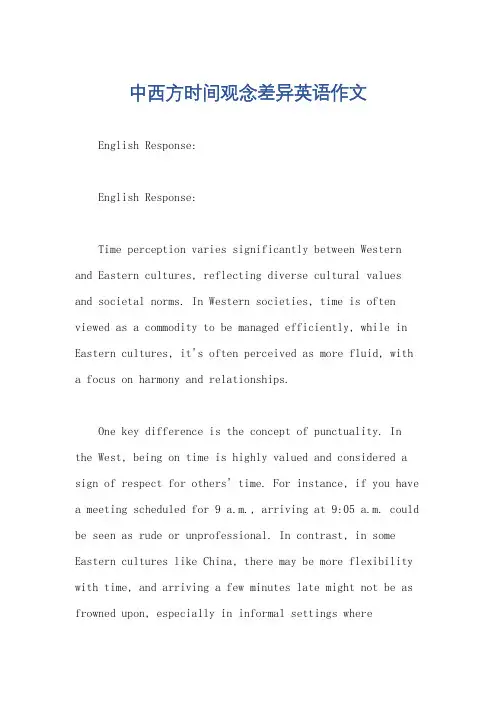
中西方时间观念差异英语作文English Response:English Response:Time perception varies significantly between Western and Eastern cultures, reflecting diverse cultural values and societal norms. In Western societies, time is often viewed as a commodity to be managed efficiently, while in Eastern cultures, it's often perceived as more fluid, with a focus on harmony and relationships.One key difference is the concept of punctuality. In the West, being on time is highly valued and considered a sign of respect for others' time. For instance, if you have a meeting scheduled for 9 a.m., arriving at 9:05 a.m. could be seen as rude or unprofessional. In contrast, in some Eastern cultures like China, there may be more flexibility with time, and arriving a few minutes late might not be as frowned upon, especially in informal settings wherepersonal relationships matter more than strict adherence to schedules.Another aspect is the pace of life. Western societies often prioritize efficiency and productivity, leading to a fast-paced lifestyle where people are constantly busy and multitasking. Phrases like "time is money" emphasize the importance of using time wisely to achieve success. On the other hand, Eastern cultures may value a slower pace of life, allowing time for contemplation, leisure, and connection with others. In Japan, for example, the concept of "Ma" refers to the interval between events, emphasizing the beauty of pauses and silence in enhancing experiences.Furthermore, attitudes towards the future also differ. Western cultures tend to have a future-oriented mindset, where planning and goal-setting are highly emphasized. People are encouraged to think ahead, set long-term objectives, and work towards achieving them systematically. In contrast, some Eastern cultures, such as those influenced by Confucianism, may prioritize the present moment and place greater importance on maintaining harmonyin interpersonal relationships. This can be seen in phrases like "活在当下" (live in the moment) in Chinese culture, emphasizing the significance of cherishing the present instead of constantly worrying about the future.In conclusion, while both Western and Eastern cultures have their own unique perspectives on time, understanding and respecting these differences can facilitate effective communication and collaboration in today's globalized world.中文回答:时间观念在西方和东方文化中存在显著差异,反映了不同的文化价值观和社会规范。
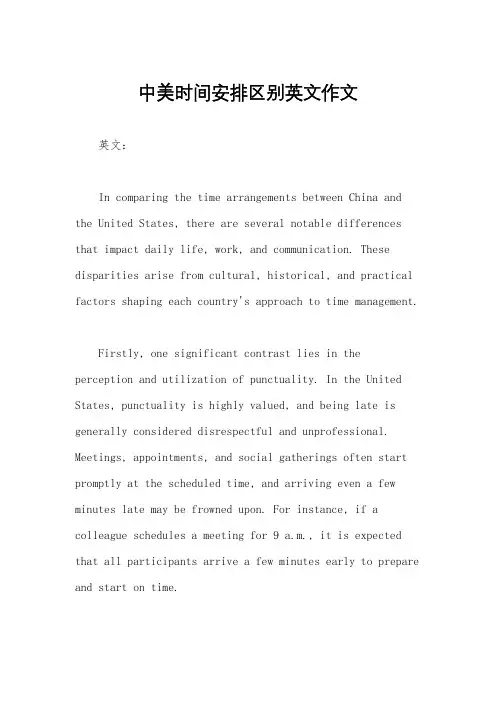
中美时间安排区别英文作文英文:In comparing the time arrangements between China and the United States, there are several notable differences that impact daily life, work, and communication. These disparities arise from cultural, historical, and practical factors shaping each country's approach to time management.Firstly, one significant contrast lies in the perception and utilization of punctuality. In the United States, punctuality is highly valued, and being late is generally considered disrespectful and unprofessional. Meetings, appointments, and social gatherings often start promptly at the scheduled time, and arriving even a few minutes late may be frowned upon. For instance, if a colleague schedules a meeting for 9 a.m., it is expected that all participants arrive a few minutes early to prepare and start on time.In China, while punctuality is still important in many contexts, there is often more flexibility regarding time arrangements. Social gatherings, for example, may have a designated start time, but it is common for attendees to arrive gradually over an extended period. This relaxed attitude towards punctuality is often influenced by the concept of "中国时间" (zhōngguó shíjiān), loosely translated as "Chinese time," which suggests a more fluid interpretation of schedules.Another notable difference is the structure of the typical workday. In the United States, the standard workweek typically consists of five days, from Monday to Friday, with weekends off. Office hours typically start around 9 a.m. and end around 5 p.m., although this can vary depending on the industry and individual workplace policies. Additionally, there is a strong emphasis on work-life balance, with many companies offering flexible work arrangements and paid time off for vacations and personal matters.On the other hand, in China, the workweek traditionallyspans from Monday to Saturday, with Sunday designated as the primary day off. Office hours may also vary but generally extend later into the evening compared to the United States, with it being common for employees to work beyond the standard 9-to-5 schedule. However, like in the U.S., there is a growing awareness of the importance of work-life balance, and some companies are adopting more flexible policies to accommodate employees' personal needs.Communication styles also differ between the two countries, which can influence time arrangements. In the United States, direct and straightforward communication is often preferred, with individuals valuing concise and efficient exchanges. This can manifest in the way meetings are conducted, with agendas outlined in advance, and discussions kept on track to ensure time is used efficiently.In China, communication tends to be more indirect, with an emphasis on maintaining harmony and saving face. This can sometimes lead to longer discussions and decisions taking more time to reach consensus. As a result, meetingsand negotiations may require more patience and flexibility regarding time management.Overall, while both China and the United States prioritize effective time management, there are distinct differences in how time is perceived, scheduled, and utilized in various aspects of daily life, work, and communication.中文:在比较中美两国的时间安排时,有几个显著的差异影响着日常生活、工作和沟通。



中西方时间观念差异-英文精品文档Compared with America being slaves to nothing but the clock .Chinese care a little about time going by .The concept of time(时间观念)①In china,words and phrases about time are very general. For example,if you date with someone, most of Chinese used to answer: in the afternoon /at night/after a while and so on.But in western, people have a very strong concept of time. If you date with a foreigner, they will ask you the Specific time, such as: what time should we meet?②In Chinese dating, people would like to come in advance and they think its represent respect and politeness.Westerners like come to the dating place on time or a few minutes late, which can give each other fully time to prepare and the enough private space. They think that arriving on time shows people have good education. Otherwise he will be regarded as unreliable or is not responsible for the other people.Most Americans place a strong emphasis on being on time. They tend to organize time by means of schedules. Time is highly valued and treated as something real in American culture because it conveys different meanings to American people. In their eyes, “Time and tide wait for no man”and “Time lost is never regained”. As a result, they want every minute to be important and meaningful, and they firmly believe that no time should be wasted.Not surprisingly, the new comers to America find the Americans seem always in a hurry and do everything at a running pace.So what makes the new comers embarrassed is to have no opportunity to smile, converse or have a short exchange with strangers because the Americans regard such practices as a waste of time.Keeping Appointments and DatesIt is considered impolite and inconsiderate to fail to keep an appointment or date without giving prior notice to the other person. If you do not plan to meet the person, then you should decline the invitation.收集于网络,如有侵权请联系管理员删除。
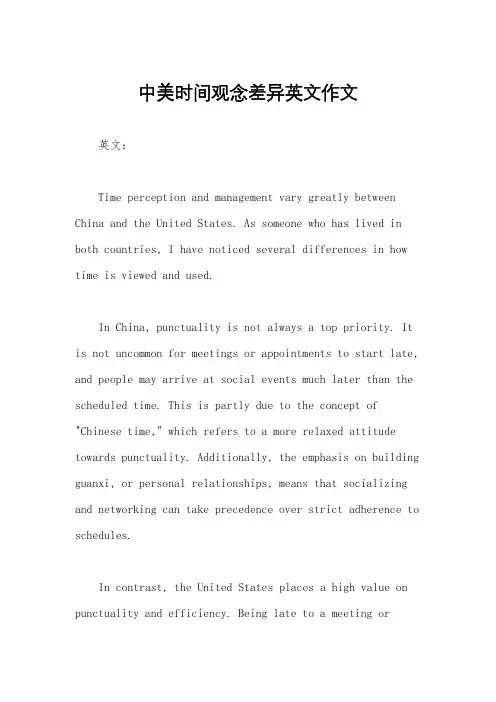
中美时间观念差异英文作文英文:Time perception and management vary greatly between China and the United States. As someone who has lived in both countries, I have noticed several differences in how time is viewed and used.In China, punctuality is not always a top priority. It is not uncommon for meetings or appointments to start late, and people may arrive at social events much later than the scheduled time. This is partly due to the concept of "Chinese time," which refers to a more relaxed attitude towards punctuality. Additionally, the emphasis on building guanxi, or personal relationships, means that socializing and networking can take precedence over strict adherence to schedules.In contrast, the United States places a high value on punctuality and efficiency. Being late to a meeting orappointment is often seen as disrespectful and unprofessional. Time is viewed as a finite resource that must be managed carefully, and people are expected to arrive on time and use their time wisely. In fact, the phrase "time is money" is a common expression in American culture.These cultural differences can lead to misunderstandings and frustrations when working or socializing across cultures. For example, a Chinese business partner may not see the importance of arriving on time for a meeting with an American counterpart, while the American may view this as a sign of disrespect. On the other hand, an American may be seen as too rigid or inflexible by a Chinese partner who values building relationships over sticking to a strict schedule.Overall, it is important to be aware of these cultural differences and to approach time management and perception with an open mind and a willingness to adapt.中文:中美对时间的感知和管理存在很大差异。

中美时间观念对比英文作文Title: The Vast Gaps in Timekeeping between China andthe US: A Non-Sequential Journey。
1. Unfolding in the Present Moment。
In the realm of timekeeping, China and the US oftenfind themselves at different stations. Like a pendulum swinging between punctuality and flexibility, Chineseculture tends to emphasize the importance of punctuality, with the saying "time is money" echoing loudly. In contrast, the American spirit of individualism often allows for amore relaxed approach, with "time is relative" being a common refrain.2. The Chinese Clock: Precision and Efficiency。
In China, the daily routine is often mapped out with precision, punctuated by the click of a wristwatch or the buzz of a mobile phone. The "9-to-5" work culturesymbolizes a commitment to a structured schedule. This clockwork efficiency is a testament to the Chinese philosophy of "time is a tool to be managed."3. The American Watch: Flexibility and Adaptability。
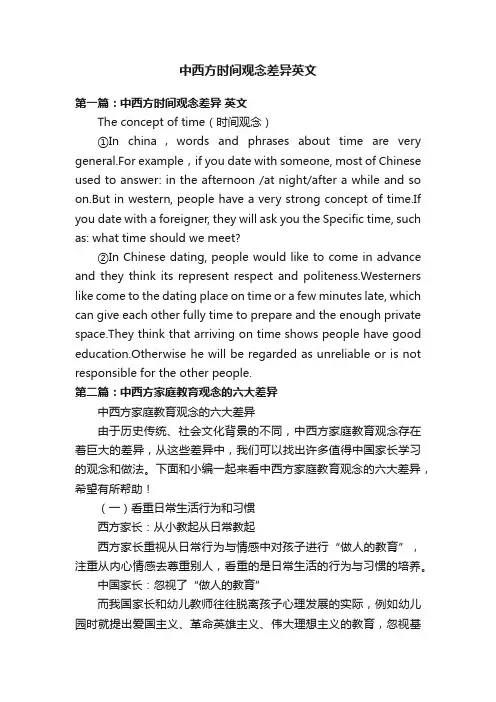
中西方时间观念差异英文第一篇:中西方时间观念差异英文The concept of time(时间观念)①In china,words and phrases about time are very general.For example,if you date with someone, most of Chinese used to answer: in the afternoon /at night/after a while and so on.But in western, people have a very strong concept of time.If you date with a foreigner, they will ask you the Specific time, such as: what time should we meet?②In Chinese dating, people would like to come in advance and they think its represent respect and politeness.Westerners like come to the dating place on time or a few minutes late, which can give each other fully time to prepare and the enough private space.They think that arriving on time shows people have good education.Otherwise he will be regarded as unreliable or is not responsible for the other people.第二篇:中西方家庭教育观念的六大差异中西方家庭教育观念的六大差异由于历史传统、社会文化背景的不同,中西方家庭教育观念存在着巨大的差异,从这些差异中,我们可以找出许多值得中国家长学习的观念和做法。
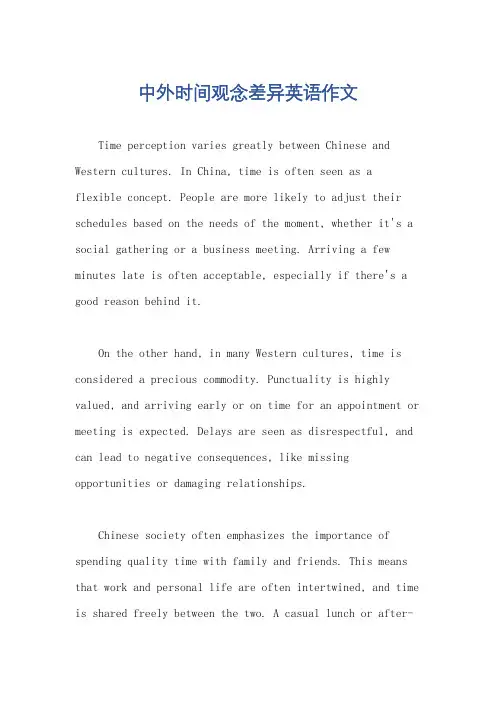
中外时间观念差异英语作文Time perception varies greatly between Chinese and Western cultures. In China, time is often seen as aflexible concept. People are more likely to adjust their schedules based on the needs of the moment, whether it's a social gathering or a business meeting. Arriving a few minutes late is often acceptable, especially if there's a good reason behind it.On the other hand, in many Western cultures, time is considered a precious commodity. Punctuality is highly valued, and arriving early or on time for an appointment or meeting is expected. Delays are seen as disrespectful, and can lead to negative consequences, like missing opportunities or damaging relationships.Chinese society often emphasizes the importance of spending quality time with family and friends. This means that work and personal life are often intertwined, and time is shared freely between the two. A casual lunch or after-work drink can easily last for hours, with no fixed schedule or agenda.Contrastingly, in Western cultures, work and personal time are often strictly separated. Once the workday ends, people tend to focus on their personal lives, leaving work-related matters behind. Appointments and meetings are scheduled with precision, and any deviation from the plan.。
中西方时间观念差异英语作文Differences in Time Consciousness between the East and the WestTime consciousness varies significantly between the East and the West. These differences can have an impact on various aspects of life, including work, social interactions, and personal schedules.In Western cultures, time is often seen as linear and quantitative. Punctuality is highly valued, and deadlines are strictly followed. Schedules are carefully planned, and meetings and appointments are usually scheduled in advance with specific start and end times. Being on time is considered a sign of respect and professionalism.In contrast, in some Eastern cultures, time is perceived more as a flexible and fluid concept. The focus is not solely on precise timekeeping but rather on achieving a certain level of completion or accomplishment. There may be a greater tolerance for delays and a more relaxed approach to schedules. Relationships and the context of the situation may take precedence over strict adherence to time.These differences can lead to misunderstandings and challenges in cross-cultural interactions. For example, in a Western business setting, being late for a meeting may be seen as unprofessional, while in some Eastern contexts, it might not hold the same significance.Understanding and respecting these time观念differences is essential in building effective relationships and successful communication across cultures. It is important to be aware of and adapt to the time expectations of different cultures when engaging in international collaborations or traveling abroad.This essay highlights the key differences in time consciousness between the East and the West, but it is important to note that these are generalizations and individual variations exist within each culture. By acknowledging and embracing these differences, we can enhance our intercultural competence and navigate diverse time-oriented situations more gracefully.。
The concept of time(时间观念)People of different cultural backgrounds have different sense of timeIn china,words and phrases about time are very general. For example,if you date with someone, most of Chinese used to answer: in the afternoon /after a while and so on.But in western, people have a very strong concept of time. If you date with a foreigner, they will ask you the Specific time, such as: what time should we meet?在中国,关于时间的单词和短语很一般。
例如,如果你和某人约会,大多数中国用于回答:下午/晚上/后一段时间等等。
但是在西方,人们有很强的时间观念。
如果你和一个外国人约会,他们会问你的具体时间,如:我们什么时间见面?In Chinese dating, people would like to come in advance and they think its represent respect. Westerners like to come to the dating place on time or a few minutes late, which can give each other fully time to prepare and the enough private space. They think that arriving on time shows people have good education. Otherwise he will be regarded as unreliable or is not responsible for the other people.在中国的相亲,人们想提前来,他们认为它表示尊重和礼貌。
中西文化差异英文简短中西文化差异是一个复杂而广泛的话题,以下是一些简短的英文描述:1.Value Systems(价值体系): Western culture emphasizes individualism, independence, and personal achievements, while Chinese culture highlights collectivism, interdependence, and harmony within the group.2.Communication Styles(交流方式): Direct and assertive communication is preferred in Western cultures, whereas indirect and polite communication is valued in Chinese culture to maintain social harmony.3.Time Orientation(时间观念): Western cultures tend to be future-oriented, emphasizing planning and scheduling, while Chinese culture is more present-oriented, focusing on the importance of the moment and relationships.4.Social Etiquette(社交礼仪): In Western cultures, people often maintain a personal distance and privacy, while inChinese culture, there is a greater emphasis on social connections, networking, and saving face.5.Perception of Authority(权威观念): Western cultures generally have a more democratic approach and value challenging authority, whereas Chinese culture places a high degree of respect for elders, hierarchy, and tradition.请注意,这些只是一些一般性观察,并不能涵盖所有个体情况。
中西时间文化差异英语作文In Western culture, time is often seen as something to be managed and scheduled. People are expected to be punctual and respect deadlines.In contrast, in Chinese culture, time is viewed as more fluid and flexible. It is common for events to start late and for plans to change at the last minute.Westerners tend to value efficiency and productivity, often multitasking and trying to accomplish as much as possible in a short amount of time.On the other hand, Chinese people prioritize relationships and harmony, sometimes sacrificing efficiency in order to maintain social connections and avoid conflict.In Western culture, being busy is often seen as a status symbol, with people boasting about how little free time they have and how many tasks they need to juggle.In Chinese culture, on the other hand, leisure time and relaxation are highly valued, with people taking breaks throughout the day to socialize and enjoy life.Overall, the differences in time culture between East and West reflect broader cultural values and priorities, shaping how people approach their daily lives and relationships.。
The concept of time(时间观念)
①In china,words and phrases about time are very general. For example,if you date with someone, most of Chinese used to answer: in the afternoon /at night/after a while and so on.
But in western, people have a very strong concept of time. If you date with a foreigner, they will ask you the Specific time, such as: what time should we meet
②In Chinese dating, people would like to come in advance and they think its represent respect and politeness. Westerners like come to the dating place on time or a few minutes late, which can give each other fully time to prepare and the enough private space. They think that arriving on time shows people have good education. Otherwise he will be regarded as unreliable or is not responsible for the other people.
Most Americans place a strong emphasis on being on time. They tend to organize time by means of schedules. Time is highly valued and treated as something real in American culture because it conveys different meanings to American people. In the ir eyes, “Time and tide wait for no man”and “Time lost is never regained”. As a result, they want every minute to be important and meaningful, and they firmly believe that no time should be wasted.
Not surprisingly, the new comers to America find the Americans seem always in a hurry and do everything at a running what makes the new comers embarrassed is to have no opportunity to smile, converse or have a short exchange with strangers because the Americans regard such practices as a waste of time.
Keeping Appointments and Dates
It is considered impolite and inconsiderate to fail to keep an appointment or date without giving prior notice to the other person. If you do not plan to meet the person,
then you should decline the invitation.。